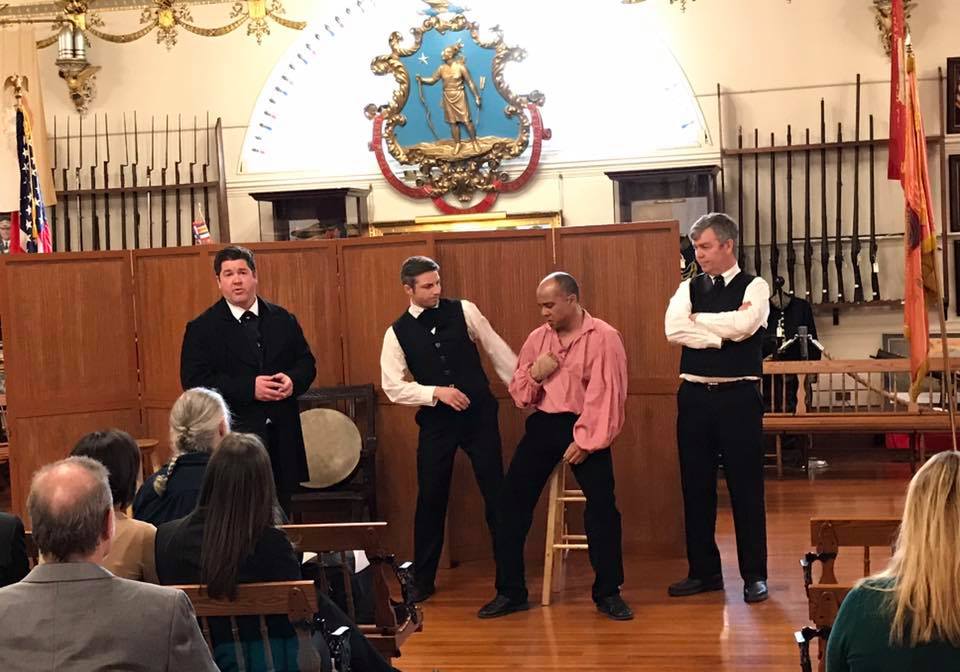
Image found on Theatre Espresso’s Facebook page
Presented by Theatre Espresso
Wendy Lement, Producer
Shelley Bolman, Artistic Director
Kortney Adams, Managing Director
May 4th, 2017
Faneuil Hall
Theatre Espresso on Facebook
This play was commissioned by “Discovering Justice: The James D. St. Clair Court Education Project.”
Review by Danielle Rosvally
(Boston, MA) Theatre Espresso is an incredible company with a mission that has become more important now than ever: to make history come alive and, through this, to engage young people in active and potent civil discourse.The Trial of Anthony BurnsThe rare opportunity to see one of Theatre Espresso’s shows was an exquisite treat, and I only wish that the public could see more of their pieces.
Theatre Espresso’s formula is deceptively simple: present a play about a pivotal moment in history that involved social justice, human rights, and some debate surrounding the fate of one of the characters. The audience is cast in the role of arbiter (in the piece I saw, The Trial of Anthony Burns, we were Massachusetts state Senators) and told they are to make an important decision at the play’s conclusion. Once the play is over, several characters from the piece are called forward for “questioning” by the audience to give additional testimony about their actions, in order to help the audience decide their fate. In The Trial of Anthony Burns, we were to determine whether to remove the judge who decided said trial or to allow him to continue to sit on the bench. Once the audience has had the opportunity to ask additional information-gathering questions of the characters, they vote on the outcome of the story and inform the affected character of their vote (for the record, we allowed the judge to sit the bench because democracy relies upon a fair judicial system which cannot be ensured if judges are removed simply because senators disagree with the decisions they make). After this, the actors come out of character to answer any lingering questions the audience might have.
Last night’s audience was a little different from what Theatre Espresso is used to dealing with; rather than the grammar school children they generally pitch to, this was a room full of lawyers from the firm sponsoring Theatre Espresso’s event. I can only imagine that this shift in audience demographics might have been a little cowing, particularly given the nature of the piece. Still, the actors attacked it with gusto and incredible energy. It was engaging theatre, well-acted, that I can only imagine leaves an incredible impression upon the students who encounter it.
The performers were top-notch, constantly rotating through an array of various roles and parts in order to serve the story and make it come alive. They were also incredibly well-read and knew the history they were presenting like the back of their hands. They answered tough questions about the scenarios both in and out of character, and never once got flustered or faltered at what this tough-as-nails audience threw at them.
The nature of the story-telling was also incredibly admirable. As much as possible, Theatre Espresso worked to weave the story through first-hand accounts: diaries, letters, newspaper clippings, etc. This concentration on primary source material helped to ensure accuracy of sentiment, and also hooked the audience using history’s own words rather than extrapolations from them. The result is a tapestry full of life and vitality, packed to the brim with raw human expression. This is how history should be taught: alive, present, and pressing.
I can’t say enough positive things about Theatre Espresso and their mission to bring history out of the classroom and into living color. As a note, Theatre Espresso is a 501(c)(3) non-profit and relies upon the support of individual donors and foundations to survive. If history is important to you, if you think civil discourse is vital to the education of our youth, please take a moment to look into how you can get involved with Theatre Espresso and bringing their wonderful programs to your community.
